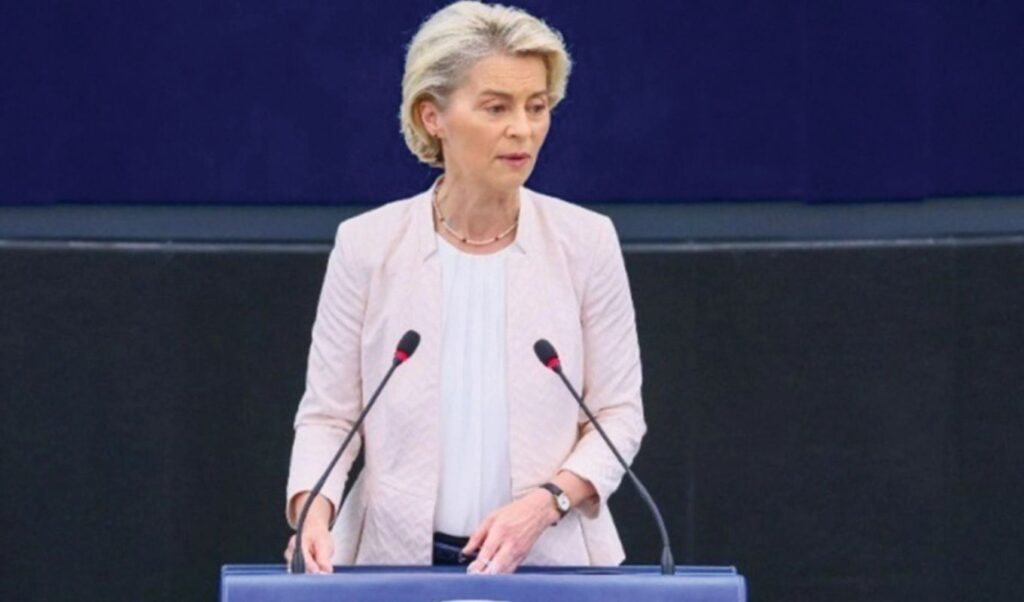The European Union will attempt to present a unified front today against Israel, following the ground invasion of Gaza and the UN Commission report that accused Tel Aviv of genocide. With particular interest, announcements from the Commission regarding sanctions against Israel are expected, with the imposition of tariffs and sanctions on “violent” settlers and “extremist” ministers appearing to be included in the package to be announced, according to Politico sources. According to EU diplomacy chief Kaja Kallas, the new sanctions package will impose tariffs on more than one-third of Israel’s trade with the EU, which amounted to €42.6 billion last year. However, what exactly these punitive measures against Israel will be remains to be seen, with the risk that sanctions could remain unenforceable being very real, as the Politico report notes.
The weak implementation of EU decisions and the divided “Union” against Israel
The EU’s track record of action against what its leaders have condemned as famine imposed by Israel on Gaza Strip civilians has been a history of actions immediately undermined by weak implementation. It has been 51 days since the Commission proposed what was then considered the mildest possible punishment against Israel to protest the mass starvation of Palestinians: suspending parts of the “Horizon” research cooperation program. But even this limited proposal did not progress beyond the discussion stage.
As Politico reports, despite the fact that more and more governments have taken action, imposing sanctions on Israeli ministers and committing to recognize a Palestinian state, the EU as a whole remains desperately divided. As von der Leyen herself admitted last week, “without a majority, it gets stuck. We need to overcome this. We don’t have the luxury of paralysis. Europe’s inability to agree is painful,” she said.
The German “block”
Friedrich Merz, Germany’s new leader, who comes from the same conservative political family as von der Leyen, has increasingly criticized the Netanyahu government since taking office as chancellor in Berlin in February. Last month he banned the export of all German weapons that could be used by Israel in Gaza.
But this immediately triggered an internal party backlash. Now, no one in Brussels believes that Merz is about to back down and support von der Leyen’s plans to suspend the EU’s trade agreement with Israel, even though some believe Germany and others will support stricter sanctions against Israel.
According to Politico, without Germany’s support, trade sanctions will not have the support of the qualified majority of EU countries needed to be enacted. Official sanctions against Israeli ministers would be even more difficult, as these measures require unanimous support from all 27 EU governments to pass.
For Merz, handling the Israeli issue is extremely difficult. The Holocaust casts a heavy shadow over German politics.
“In politics and society, we have turned a blind eye for too long to the fact that a significant number of people who have come to Germany in recent decades were socialized in countries of origin where anti-Semitism is essentially state doctrine, where hatred for Israel is taught even to children,” he stated.
Countries that do not take action to stop genocide in Gaza could potentially be considered complicit under the Convention on the Prevention and Punishment of the Crime of Genocide, an international treaty adopted by the United Nations on December 9, 1948, which – theoretically – could serve as leverage to pressure more European governments to support EU sanctions plans.
Germany is not alone. EU diplomats noted that several other countries, such as Italy, Poland, Hungary and Austria, also refused to support punitive measures against Israel.
However, for Merz, domestic factors are likely to make it impossible for his government to support that Israel is committing genocide in Gaza, let alone take concrete measures to restrict Israel-EU trade.
Katja Hoyer, a German-British academic and author of the book “Beyond the Wall,” said: “The CDU/CSU has long been home to ardent Israel supporters. For many, this is an integral part of the party’s soul. It’s already under pressure for various unfulfilled promises and faces disappointment from conservatives on a range of issues, and I don’t know if Merz will manage to emerge unscathed from a policy change in this area.” As for von der Leyen, the fear of “Europe’s paralysis” is very likely to continue.
With information from Politico




